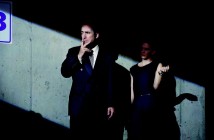March 15, 2015, 9:00 p.m. (EST), CBS
At first glance, “Open Source” is about superiority, which is a weird tone for a show that usually revels in ambiguity and in a layered analysis of its characters moral quandaries. I’m not sure how intentional it is that the show sets up two men as morally superior while two women falter in the face of difficult decisions, but seeing as Alicia and Diane are main characters with years of complexity under their belts and plenty of moments of unforced righteousness behind them, I’m going to assume there is no larger meaning behind this (and, as we’ll get into, I’m not sure the dynamic is nearly as simple as this). Yet the show arguably sets up Alicia in opposition to Frank Prady and Diane in opposition to Kurt, and in both cases, it seems to contemplate that the men in question have the moral high ground.
Frank Prady has always been a bit of a cipher, set up as this impossibly perfect candidate who wants to shoot straight and debate the issues, so its no surprise that the show builds to Alicia’s realization that Frank is better than her just as she seems poised to win the election. After he confesses to being a Jesuit, Alicia seems more sure than ever that Frank is better than her, but I’m not sure its as easy to read that situation as she (and maybe the show) seems to think. On the one hand, both Alicia and Frank have lied in the campaign, and yes, Frank’s lie (he has deep moral convictions that might read as weird) is less morally suspect than Alicia’s (she is knowingly taking money from the top drug lord in Chicago). But I think the more interesting question is the one Alicia pointed out last week in her own headspace, when she imagined telling Frank that if he wouldn’t lie, she didn’t think he should run. Which of these two would make the better State’s Attorney? Is it as simple as saying Frank, as a better person, would do a better job? Or might Alicia, with her political acumen and deep sense of pragmatism, actually be what the city of Chicago needs in the office? This season’s tireless (and for some, myself excluded, tiresome) exploration of Alicia’s moral development has sometimes missed one of the larger themes this show has explored: the idea that a certain level of moral flexibility might be an asset in politics and the law. Nobility has its place, but I think The Good Wife has always been skeptical of where it belongs, and how it serves people in positions of power. Season six has struck me as far more openly moralistic than this show has ever been previously, and while it has lead to some fascinating character moments for Alicia, it has hampered this larger exploration in ways that may have long term effects. If this season wonders whether Alicia is a good person, I think the question in the aggregate is whether being a good person would be a good thing for her. The obvious answer is yes, but I think this show has always played its cards closer to the vest than this, has always left it up to viewers to decide where we fall on any of its characters, and whether their failings must always be bad things.
If my read on the Alicia and Frank dynamic holds any water, then I think a similar analysis holds for Diane and Kurt. On the surface, Kurt’s steadfast adherence to the facts and the truth gives him the moral edge over Diane, who is willing to bend those facts in her favor to serve both her immediate ends of winning the case and a larger political goal of scoring major points for gun control. But to assume The Good Wife is absolutely in favor of Kurt’s stubborn adherence to the facts wherever they lead him is perhaps unfair to the show, which is at least arguably sympathetic to Diane’s efforts to both win a large settlement for her paralyzed client and potentially do work towards keeping untraceable guns off the streets. The case of the week is another example of the show’s love of cutting edge technology, but the marital conflict between Kurt and Diane far outpaces the techno-mystery of why, exactly, the 3-D printed gun misfired (although that too has enough fun twists and good Judge Abernathy moments to be worth while). Again, it appears as if the show condemns Diane for her actions here, or at least that Diane comes to the conclusion (as Alicia does above) that she is in the wrong and that Kurt has the moral high ground. Yet, as The Good Wife teaches us again and again, the bigger picture makes things murkier. Diane’s advocacy, in both a micro and macro sense, may have greater worth than Kurt’s diligent honesty, even if he is ostensibly “doing the right thing” while she makes some compromises for the sake of the greater good.
Perhaps the key to the ethical morass of this episode, which appears to say one thing but may actually say something quite different, is the subplot involving Louis Canning. Ostensibly on his death bed, Canning asks Alicia to liquidate his $18 million in stocks and make a donation to the family of the little girl whose death provided him his much needed kidney. It turns out the family wants to donate the money to a pro-Palestinian charity, and Alicia decides to look into fulfilling Canning’s wishes. This works out to make two interrelated points: first, Alicia is doing a small act of kindness (fulfilling a dying man’s wishes) that may result in a larger injustice (if the money is in fact going to Hamas), seemingly scoring karma points but ultimately potentially creating larger problems. Second, while it seems initially like the “right thing to do,” it is in fact in all likelihood a set up by Canning and David Lee to smear Alicia with the “giving money to Hamas” rumor just a few days before the election. What appears to be the right thing to do may not always be so simplistically superior as a moral choice. Minor nobilities can lead to larger scale injustices. Conversely, minor acts of moral compromise might lead to major steps forward for good causes. Who is ultimately doing right in these situations? How do we weigh the moral worth of decisions that seem to clash in this way? For an episode that initially appears to be oddly moralistic for The Good Wife, “Open Source” reveals itself to be something much more complex and interesting.
Doing the right thing is frequently more complicated than we give it credit for being. Moral uprightness gets a reputation for being easy and intuitive, but the world is complicated, and “right” is a constantly moving target. This could lead all too easily to a moral relativism in which right is subjective and the person who is best at rationalizing their behavior is the most moral. Or it could lead to the world we live in, a world in which what is right is a more multifaceted and nebulous than we often think, a world where small acts of kindness may not be obviously superior to minor moral compromises, a world in which moral decisions are made on massive scales as well as in tiny moments of interpersonal interaction. I’m not convinced “right” is a moving target so much as its one that is constantly obfuscated by problems of perspective and debates about priorities. I am sure that an episode that leaves clear answers so tantalizingly out of reach is a strong indication that The Good Wife is back on track.
The Roundup
- “Is this another come to Jesus moment? Because I don’t know how many more of these I can take.”
- “Is anybody else…really disturbed by this?”
- “I voted absentee.” “Thank you.” “No, against you.”
- “Still got some hard feelings, there, Cary?” “You mean from you trying to put me in jail for fifteen years? No, no that’s ancient history.”
- “If they know you have doubts, they’ll put you back on the stand to exploit them. Where are you going?” “To assuage my doubts.”
- “You may not want Peter as a friend, but you certainly don’t want him as an enemy.”
- “I know you’re a bad man, but…I sort of miss you.”
- “Your job is to give her chapstick and breath mints, not bust my balls.” “God, handsome men are so weak.”
- “Anything you’d do differently?” “I’d be more honest.”
- “You wanted to do good.” “No I didn’t. When have you ever known me to want to do good?”
For an episode that initially appears to be oddly moralistic for The Good Wife, “Open Source” reveals itself to be something much more complex and interesting.
-
GREAT




